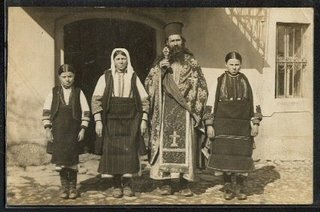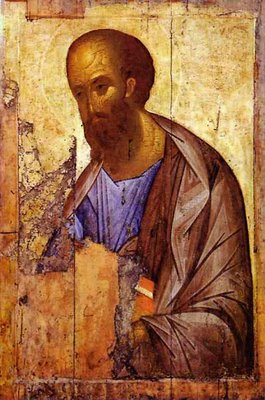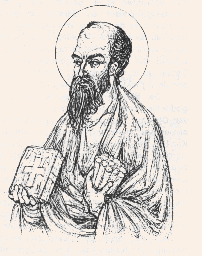St. John Chrysostom: On the Priesthood and St. Paul
 St. John Chrysostom, in disucssing the difficulties of pastoring the members of the church, makes this observation on the qualifications of a priest.
St. John Chrysostom, in disucssing the difficulties of pastoring the members of the church, makes this observation on the qualifications of a priest.To meet all these difficulties, there is no help given but that of speech (logos), and if any be destitute of this power, the souls of those who are put under his charge (I mean of the weaker and more meddlesome kind) are no better off than ships continually stormtossed. So that the Priest should do all that in him lies, to gain this means of strength.
His interlocutor Basil, however, questions his logic and his claim that the gift of eloquence is necessary for the priest by appealing to St. Paul and the apostles as "illiterate" men--idiotes.
6. Basil: "Why, then, was not St. Paul ambitious of becoming perfect in this art? He makes no secret of his poverty of speech, but distinctly confesses himself to be unskilled, even telling the Corinthians so,38 who were admired for their eloquence, and prided themselves upon it."
Chrysostom: This is the very thing which has ruined many and made them remiss in the study of true doctrine. For while they failed to fathom the depths of the apostle's mind, and to understand the meaning of his words, they passed all their time slumbering and yawning, and paying respect not to that ignorance which St. Paul acknowledges, but to a kind from which he was as free as any man ever was in the world.
But leaving this subject to await our consideration, I say this much in the meantime. Granting that St. Paul was in this respect as unskilled as they would have him to be, what has that to do with the men of to-day? For he had a greater power by far than power of speech, power which brought about greater results too; which was that his bare presence, even though he was silent, was terrible to the demons. But the men of the present day, if they were all collected in one place, would not be able, with infinite prayers and tears, to do the wonders that once were done by the handkerchief of St. Paul. He too by his prayers raised the dead,39 and wrought such other miracles, that he was held to be a god by heathen;40 and before he was removed from this life, he was thought worthy to be caught up as far as the third heaven, and to share in such converse as it is not lawful for mortal ears to hear.41 But the men of to-day-not that I would say anything harsh or severe, for indeed I do not speak by way of insult to them, but only in wonder-how is it that they do not shudder when they measure themselves with so great a man as this? For if we leave the miracles and turn to the life of this blessed saint, and look into his angelic conversation, it is in this rather than in his miracles that thou wilt find this Christian athlete a conqueror. For how can one describe his zeal and forbearance, his constant perils, his continual cares, and incessant anxiety for the Churches; his sympathy with the weak, his many afflictions, his unwonted persecutions, his deaths daily? Where is the spot in the world, where is the continent or sea, that is a stranger to the labours of this righteous man? Even the desert has known his presence, for it often sheltered him in time of danger. For he underwent every species of attack, and achieved every kind of victory, and there was never any end to his contests and his triumphs.
Yet, all unawares, I have been led to do this man an injury. For his exploits are beyond all powers of description, and beyond mine in particular, just as the masters of eloquence surpass me. Nevertheless, since that holy apostle will judge us, not by the issue, but by the motive, I shall not forbear till I have stated one more circumstance which surpasses anything yet mentioned, as much as he himself surpasses all his fellow men. And what is this? After so many exploits, after such a multitude of victories, he prayed that he might go into hell, and be handed over to eternal punishment, if so be that those Jews, who had often stoned him, and done what they could to make away with him, might be saved, and come over to Christ.42 Now who so longed for Christ? If, indeed, his feelings towards him ought not to be described as something nobler than longing; shall we then any more compare ourselves with this saint, after so great grace was imparted to him from above, after so great virtue was manifested in himself? What could be more presumptuous?
 Now, that he was not so unskilled, as some count him to be, I shall try to show in what follows. The unskilled person in men's estimation is not only one who is unpracticed in the tricks of profane oratory,43 but the man who is incapable of contending for the defence of the right faith, and they are right. But St. Paul did not say that he was unskilled in both these respects, but in one only; and in support of this he makes a careful distinction, saying that he was "rude in speech, but not in knowledge."44 Now were I to insist upon the polish of Isocrates, the weight of Demosthenes, the dignity of Thucydides, and the sublimity of Plato, in any one bishop, St. Paul would be a strong evidence against me. But I pass by all such matters and the elaborate ornaments of profane oratory; and I take no account of style or of delivery; yea let a man's diction be poor and his composition simple and unadorned, but let him not be unskilled in the knowledge and accurate statement of doctrine; nor in order to screen his own sloth, deprive that holy apostle of the greatest of his gifts, and the sum of his praises.
Now, that he was not so unskilled, as some count him to be, I shall try to show in what follows. The unskilled person in men's estimation is not only one who is unpracticed in the tricks of profane oratory,43 but the man who is incapable of contending for the defence of the right faith, and they are right. But St. Paul did not say that he was unskilled in both these respects, but in one only; and in support of this he makes a careful distinction, saying that he was "rude in speech, but not in knowledge."44 Now were I to insist upon the polish of Isocrates, the weight of Demosthenes, the dignity of Thucydides, and the sublimity of Plato, in any one bishop, St. Paul would be a strong evidence against me. But I pass by all such matters and the elaborate ornaments of profane oratory; and I take no account of style or of delivery; yea let a man's diction be poor and his composition simple and unadorned, but let him not be unskilled in the knowledge and accurate statement of doctrine; nor in order to screen his own sloth, deprive that holy apostle of the greatest of his gifts, and the sum of his praises.
7. For how was it, tell me, that he confounded the Jews which dwelt at Damascus,45 though he had not yet begun to work miracles? How was it that he wrestled with the Grecians and threw them?46 and why was he sent to Tarsus? Was it not because he was so mighty and victorious in the word, and brought his adversaries to such a pass that they, unable to brook their defeat, were provoked to seek his life? At that time, as I said, he had not begun to work miracles, nor could any one say that the masses looked upon him with astonishment on account of any glory belonging to his mighty works, or that they who contended with him were overpowered by the force of public opinion concerning him. For at this time he conquered by dint of argument only. How was it, moreover, that he contended and disputed successfully with those who tried to Judaize in Antioch? and how was it that that Areopagite,47 an inhabitant of Athens, that most devoted of all cities to the gods, followed the apostle, he and his wife? was it not owing to the discourse which they heard? And when Eutychus48 fell from the lattice, was it not owing to his long attendance even until midnight to St. Paul's preaching? How do we find him employed at Thessalonica and Corinth, in Ephesus and in Rome itself? Did he not spend whole nights and days in interpreting the Scriptures in their order? and why should any one recount his disputes with the Epicureans and Stoics.49 For were we resolved to enter into every particular, our story would grow to an unreasonable length.
When, therefore, both before working miracles, and after, St. Paul appears to have made much use of argument, how can any one dare to pronounce him unskillful whose sermons and disputations were so exceedingly admired by all who heard them? Why did the Lycaonians50 imagine that he was Hermes? The opinion that he and Barnabas were gods indeed, arose out of the sight of their miracles; but the notion that he was Hermes did not arise from this, but was a consequence of his speech. In what else did this blessed saint excel the rest of the apostles? and how comes it that up and down the world he is so much on every one's tongue? How comes it that not merely among ourselves, but also among Jews and Greeks, he is the wonder of wonders? Is it not from the power of his epistles? whereby not only to the faithful of to-day, but from his time to this, yea and up to the end, even the appearing of Christ, he has been and will be profitable, and will continue to be so as long as the human race shall last. For as a wall built of adamant, so his writings fortify all the Churches of the known world, and he as a most noble champion stands in the midst, bringing into captivity every thought to the obedience of Christ, casting down imaginations, and every high thing which exalts itself against the knowledge of God,51 and all this he does by those epistles which he has left to us full of wonders and of Divine wisdom. For his writings are not only useful to us, for the overthrow of false doctrine and the confirmation of the true, but they help not a little towards living a good life. For by the use of these, the bishops of the present day fit and fashion the chaste virgin, which St. Paul himself espoused to Christ,52 and conduct her to the state of spiritual beauty; with these, too, they drive away from her the noisome pestilences which beset her, and preserve the good health thus obtained. Such are the medicines and such their efficacy left us by this so-called unskillful man, and they know them and their power best who constantly use them. From all this it is evident that St. Paul had given himself to the study of which we have been speaking with great diligence and zeal.
8. Hear also what he says in his charge to his disciple:53 "Give heed to reading, to exhortation, to teaching," and he goes on to show the usefulness of this by adding, "For in doing this thou shalt save both thyself and them that hear thee."54 And again he says, "The Lord's servant must not strive, but be gentle towards all, apt to teach, forbearing;"55 and he proceeds to say, "But abide thou in the things which thou hast learned, and hast been assured of, knowing of whom thou hast learned them, and that from a babe thou hast known the sacred writings which are able to make thee wise unto salvation,"56 and again, "Every Scripture is inspired of God, and also profitable for teaching, for reproof, for correction, for instruction which is in righteousness, that the man of God may be complete."57 Hear what he adds further in his directions to Titus about the appointment of bishops. "The bishop," he says, "must be holding to the faithful word which is according to the teaching, that he may be able to convict the gainsayers."58 But how shall any one who is unskillful as these men pretend, be able to convict the gainsayers and stop their mouths? or what need is there to give attention to reading and to the Holy Scriptures, if such a state of unskillfulness is to be welcome among us? Such arguments are mere makeshifts and pretexts, the marks of idleness and sloth. But some one will say, "it is to the priests that these charges are given:"-certainly, for they are the subjects of our discourse. But that the apostle gives the same charge to the laity, hear what he says in another epistle to other than the priesthood: "Let the word of Christ dwell in you richly in all wisdom,"59 and again, "Let your speech be always with grace seasoned with salt, that ye may know how ye ought to answer each one,"60 and there is a general charge to all that they "be ready to"61 render an account of their faith, and to the Thessalonians, he gives the following command: "Build each other up, even as also ye do."62 But when he speaks of priests he says, "Let the elders that rule well be counted worthy of double honor, especially those who labor in the word, and in teaching."63 For this is the perfection of teaching when the teachers both by what they do, and by what they say as well, bring their disciples to that blessed state of life which Christ appointed for them. For example alone is not enough to instruct others. Nor do I say this of myself; it is our Saviour's own word. "For whosoever shall do and teach them, he shall be called great.64 Now if doing were the same as teaching, the second word here would be superfluous; and it had been enough to have said "whosoever shall do" simply. But now by distinguishing the two, he shows that practice is one thing, and doctrine another, and that each needs the help of the others in order to complete edification. Thou hearest too what the chosen vessel of Christ says to the Ephesian elders: "Wherefore watch ye, remembering that for the space of three years, I ceased not to admonish every one, night and day, with tears." But what need was there for his tears or for admonition by word of mouth, while his life as an apostle was so illustrious? His holy life might be a great inducement to men to keep the commandments, yet I dare not say that it alone could accomplish everything.
9. But when a dispute arises concerning matters of doctrine, and all take their weapons from the same Scriptures, of what weight will any one's life be able to prove? What then will be the good of his many austerities, when after such painful exercises, any one from the Priest's great unskillfulness in argument fall into heresy, and be cut off from the body of the Church, a misfortune which I have myself seen many suffering. Of what profit then will his patience be to to him? None; no more than there will be in a sound faith if the life is corrupt. Wherefore, for this reason more than for all others, it concerns him whose office it is to teach others, to be experienced in disputations of this kind. For though he himself stands safely, and is unhurt by the gainsayers, yet the simple multitude under his direction, when they see their leader defeated, and without any answer for the gainsayers, will be apt to lay the blame of his discomfiture not on his own weakness, but on the doctrines themselves, as though they were faulty; and so by reason of the inexperience of one, great numbers are brought to extreme ruin; for though they do not entirely go over to the adversary, yet they are forced to doubt about matters in which formerly they firmly believed, and those whom they used to approach with unswerving confidence, they are unable to hold to any longer steadfastly, but in consequence of their leader's defeat, so great a storm settles down upon their souls, that the mischief ends in their shipwreck altogether. But how dire is the destruction, and how terrible the fire which such a leader brings upon his own wretched head for every soul which is thus lost, thou wilt not need to learn from me, as thou knowest all this perfectly. Is this then pride, is this vainglory in me, to be unwilling to be the cause of the destruction of so many souls? and of procuring for myself greater punishment in the world to come, than that which now awaits me there? Who would say so? surely no one, unless he should wish to find fault where there is none, and to moralize over other men's calamities.


 You may now access Nea Romaiosyni through Facebook. Find our Group by searching “Nea Romaiosyniâ€.
You may now access Nea Romaiosyni through Facebook. Find our Group by searching “Nea Romaiosyniâ€.